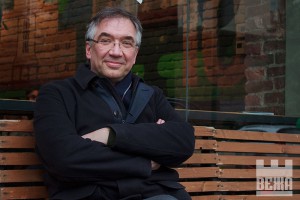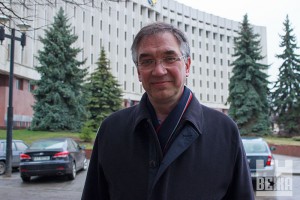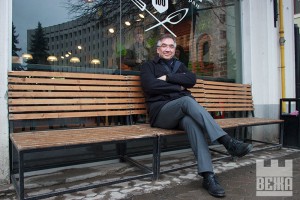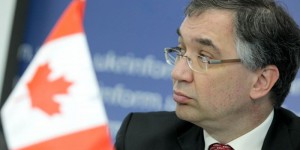Source: “Vezha” TV and radio company
– We know that your family comes from the Carpathian region (your father was born in Bili Oslavy village (presently Nadvirna region near Ivano-Frankivsk, Ukraine) and your mother comes from Buchach (Ternopil region). This has not been your first visit to Ivano-Frankivsk. What is your overall impression of the city? – I believe Ivano-Frankivsk has done a lot in the past 5 or 6 years in terms of its development. Now Ivano-Frankivsk is a much more attractive city for its visitors than it used to be. Moreover, it’s a reputable city in terms of its organizations, companies, entrepreneurs and activists. I’ve even heard that people from other regions of Ukraine tend to be jealous of the success of Ivano-Frankivsk residents’. My last visit here was about a year ago. I love coming back here. You can notice changes better when you don’t live in the place but only come to visit it from time to time. – What is the purpose of your trip to Ivano-Frankivsk? – We fund PLEDDG Project, which defines and provides means for the city’s development strategy such as social, environmental and economic strategies. This is a complex strategy for four cities: Kolomyia, Dolyna, Ivano-Frankivsk and Yaremche. I wanted to see the strategy in practice and see whether the allocated funds are spent accordingly. What I see now is that with decentralization in action, cities have means to implement projects; however, what they miss is the structure, which can be provided by our consultants. All funds, government, business and public efforts should be used for the benefit of the people. – What are some of the major differences between Ukraine and Canada? – Well, first of all, I believe what used to be a difference and which is less perceivable now is that when something bad happens in Canada people tend to ask a question “How can we fix it?” rather than find someone to blame. Secondly, I think Canadians are a more easy-going sort of people; we live in three dimensions, while Ukrainians live in as many as four or even five. There are official dimensions, less official, non-official, which people navigate subconsciously. – In your opinion, what can contribute to Ukraine’s positive development? – I think many positive changes have occurred owing to the Maidan and a horizontal movement of labor. What remains unresolved is its coordination with a vertical government structure. There is a trend in Ukraine: if a civic activist becomes a politician, they are labelled as a traitor or a turncoat. I may look biased here since I am a public official myself; still, I believe it’s impossible to make efficient institutions without certain vertical, bureaucratic and other structures. People need to see the government that takes their side. The question remains – how to achieve this? – Last year marked the 125-anniversary of the first immigration of Ukrainians to Canada. Do Ukrainians find what they were looking for when they arrive in Canada? – We cannot provide all the guarantees in each specific case, however, our country does not impose anything, except legal frameworks. We provide people with the tools and they decide how to make use of them. We offer equal opportunities for children and young people. According to international standards, in Canada the correlation between social status of parents and their children is the least notable. We have noticed that immigrants’ children are doing better at schools than old-line Canadians’ children. It’s important for us to offer people an opportunity to realize their potential. – You have been actively involved in the Plast movement in Canada. Do you pursue it here in Ukraine as well? – As a matter of fact, I do it whenever possible, given the time constraints. Last spring we participated in the cleaning of the Baikove cemetery. During my visit to Ivano-Frankivsk I managed to meet Plast members from Bili Oslavy, who are very active. – What new projects are you preparing for Ukraine? – We will continue working with cities in Ivano-Frankivsk region, as well as in three other regions, which are Vinnytsia, Poltava and Zaporizhia. Besides, we resumed and prolonged our military mission for another three years, and I hope that very soon you will see the next rotation of our military forces. Snizhana SAMANCHUK
Background information:
Roman Waschuk was born in 1962 in Toronto, Ontario. His parents immigrated to Canada after the Second World War. His father was born in Bili Oslavy village (now Nadvirna region near Ivano-Frankivsk) and his mother was born in Buchach (now Ternopil region). His grandfather on the maternal side was a director of Buchach Cooperative of Mykola Kharkhalis. His mother was baptized in the Saint Nicolas church and, together with her parents, she lived in 9 Mitskevych Street.
In 1987 he began his career in the diplomatic service of the Ministry of Foreign Affairs of Canada. Between 1988 and 1991, he worked in the Canadian Embassy in USSR.
From 1994 to 1998, he served as advisor at the Canadian Embassy in Kyiv. He also worked in Berlin in Ottawa Headquarters.
In 2011, Roman Waschuk served as Extraordinary and Plenipotentiary Ambassador of Canada to Serbia (in Belgrade).
Since 2014, he has served as Extraordinary and Plenipotentiary Ambassador of Canada to Kyiv. On December 1, 2014, he handed over diplomatic credentials to the President of Ukraine Petro Poroshenko.
In November 19-20, 2015, Roman Waschuk visited Ternopil region, mainly Buchach, as part of his official trip.
Mr. Waschuk signed the petition of foreign ambassadors following the resignation of the Minister of Economic Development and Trade, Mr. Aivaras Abromavičius.
He is fluent in English, French, German, Russian, Ukrainian, Polish, and Serbian.





